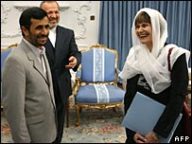 “It’s a measure of America’s multicultural journey over the past half-century that we’ve gone from ‘God and Man at Yale’ to Allah and Woman at Harvard. In a contretemps scarcely imaginable in William F. Buckley’s day, Harvard has closed one of its gyms to men for six hours a week so that Muslim women can exercise comfortably. ‘Sharia at Harvard,’ warned blogger Andrew Sullivan. A Harvard Crimson columnist blasted ‘Harvard’s misguided accommodationist policy.’
“It’s a measure of America’s multicultural journey over the past half-century that we’ve gone from ‘God and Man at Yale’ to Allah and Woman at Harvard. In a contretemps scarcely imaginable in William F. Buckley’s day, Harvard has closed one of its gyms to men for six hours a week so that Muslim women can exercise comfortably. ‘Sharia at Harvard,’ warned blogger Andrew Sullivan. A Harvard Crimson columnist blasted ‘Harvard’s misguided accommodationist policy.’
“Meanwhile, a separate controversy has flared over broadcasting the Muslim call to prayer from the steps of Harvard’s main library during Islamic Awareness Week. Three graduate students, writing in the Crimson, argued that the prayer sowed ‘seeds of division and disrespect’ by declaring that ‘there is no lord except God’ and that ‘Mohammad is the Messenger of God’. Harvard, they wrote, ‘should not grant license to any religious group, minority or otherwise, to use a loudspeaker to declare false the profoundly important and personal beliefs of others.’ …
“My reaction is more along the lines of: ‘Get a grip.’ It’s reasonable to set aside a few off-peak hours at one of Harvard’s many gyms. It’s not offensive to have the call to prayer echoing across Harvard Yard, any more than it is to ring church bells or erect a giant menorah there.
“I share the apprehensions stirred up by the more radical followers of Islam, with their drive to restore the caliphate and subjugate women. But I come to this issue as a member of another minority religion, Judaism, whose adherents often seek flexibility from the majority culture in order to practice their faith. As with Islam, my religion’s more observant believers endorse practices – segregating the sexes at prayer, excluding women from engaging in certain rituals – that I find disturbing, bordering on offensive. I have relatives who would shrink from shaking my hand. Still, I would defend to the death their right not to touch me.”
Ruth Marcus in the Washington Post, 26 March 2008

 Swiss Foreign Minister Micheline Calmy-Rey has been widely criticised for donning a white headscarf to meet Iranian President Mahmoud Ahmadinejad. Well-known for her stand on women’s rights, she has provoked headlines such as “Just like a submissive woman”.
Swiss Foreign Minister Micheline Calmy-Rey has been widely criticised for donning a white headscarf to meet Iranian President Mahmoud Ahmadinejad. Well-known for her stand on women’s rights, she has provoked headlines such as “Just like a submissive woman”. COPENHAGEN — Tension about the possibility of a Muslim politician addressing the Danish parliament in a headscarf has flared again, but Prime Minister Anders Fogh Rasmussen tried to calm the debate on Tuesday.
COPENHAGEN — Tension about the possibility of a Muslim politician addressing the Danish parliament in a headscarf has flared again, but Prime Minister Anders Fogh Rasmussen tried to calm the debate on Tuesday.